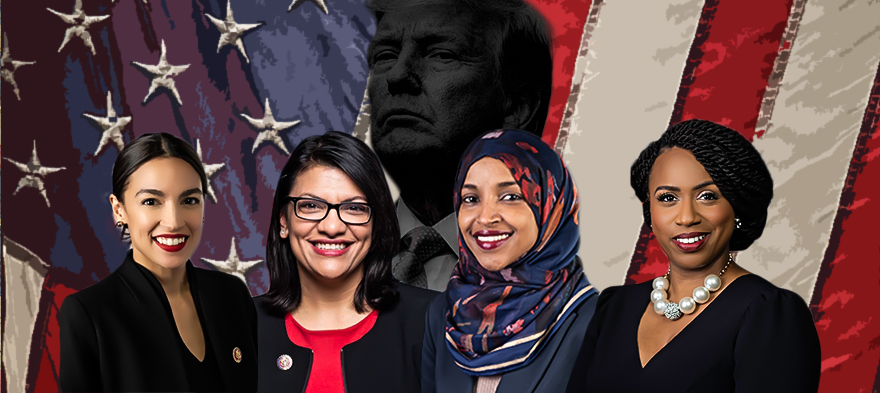
On Sunday, the 45th president of the United States told four congresswomen of color to “go back” to the countries from which they came.
....and viciously telling the people of the United States, the greatest and most powerful Nation on earth, how our government is to be run. Why don’t they go back and help fix the totally broken and crime infested places from which they came. Then come back and show us how....
— Donald J. Trump (@realDonaldTrump) July 14, 2019
The president’s assault on these four women of color continued well into Monday. I am a Black woman and I'm here to tell you—the microaggression is not all that micro. As I processed the racist rhetoric tweeted from our nation’s highest office, I could not help but think about the words Malcolm X spoke more than 50 years ago:
The most disrespected person in America is the Black woman. The most unprotected person in America is the Black woman. The most neglected person in America is the Black woman.
Malcolm X in Los Angeles, May 5, 1962
As I read what the leader of this nation said about those women of color, I felt hurt, marginalized and misunderstood. But it was not unfamiliar. It reminded me of countless experiences I and other women of color face working in education.
[pullquote position="right"]Black women account for only 5% of the teaching population.[/pullquote] These numbers are troubling, especially as we seek to diversify the teaching population across this nation. And it's not only Black female educators who suffer. The numbers are even grimmer for Black male educators, who are only leading 2% of our classrooms.
This is in spite of the fact that there is mounting evidence that shows all students, but especially students of color, benefit from having one or more teachers of the same race at some point in their educational careers. A John Hopkins study found that if a low-income, Black male student has a Black teacher in third, fourth or fifth grade, he is 39% less likely to drop out of high school. And if a low-income, Black male or female student have at least one Black teacher over the course of their educational career—especially of the same gender—they are also more likely to aspire to attend a four-year college. Yet, Black educators continue to be relatively rare.
Black women are more likely to report dissatisfaction with their teacher induction and mentoring experiences and their salary, and they are more likely to cite a lack of resources, concerns about job security, lack of classroom autonomy, and a lack of collegial support than other teachers.
Black women often silence themselves in their schools for fear of being seen as “the angry Black woman.” When women of color do speak out, we are mischaracterized, told we are loud and often have the tears of White women used as weapons against us. The fragility is tiring.
[pullquote]To achieve equitable schools, we have to face injustice, trace injustice and replace the injustice in every aspect of what we do.[/pullquote] We have to start asking some uncomfortable questions:
These are things we must trace.
I have come to be comfortable with the understanding that the tendency for others to be intimidated by my strength, complexity, depth, love, voice and all-around magic is not my problem but theirs. I stand here to declare that I am unapologetically me.
My colleague Tonia Holmes-Sutton and I are officially launching the #WOCEDCHAT (Woman of Color—pronounced WOKE—Education Chat) every third Thursday of the month starting July 25 at 7:30 p.m.
We welcome all who wish to learn how to face, trace and replace commonly held misconceptions about women of color in education and create a new narrative for women of color in education. We hope to see you there—to be seen, heard and, most importantly, respected!
Kelisa Wing is the author of "Weeds & Seeds: How To Stay Positive in the Midst of Life’s Storms" and "Promises and Possibilities: Dismantling the School to Prison Pipeline" (both available on Amazon). She also is a 2017 State Teacher of the year, speaker, teacher and activist for discipline reform. Kelisa holds a bachelor’s degree in English from the University of Maryland University College, a master of arts in secondary education and an educational specialist degree with a concentration in curriculum, instruction and educational leadership from the University of Phoenix. She is currently enrolled at Walden University in the doctor of education program. All views expressed are her own and do not reflect the views of any others.
The story you tell yourself about your own math ability tends to become true. This isn’t some Oprah aphorism about attracting what you want from the universe. Well, I guess it kind of is, but...
If you have a child with disabilities, you’re not alone: According to the latest data, over 7 million American schoolchildren — 14% of all students ages 3-21 — are classified as eligible for special...
The fight for educational equity has never been just about schools. The real North Star for this work is providing opportunities for each child to thrive into adulthood. This means that our advocacy...
Your donations support the voices who challenge decision makers to provide the learning opportunities all children need to thrive.
Ed Post is the flagship website platform of brightbeam, a 501(c3) network of education activists and influencers demanding a better education and a brighter future for every child.
© 2020–2024 brightbeam. All rights reserved.